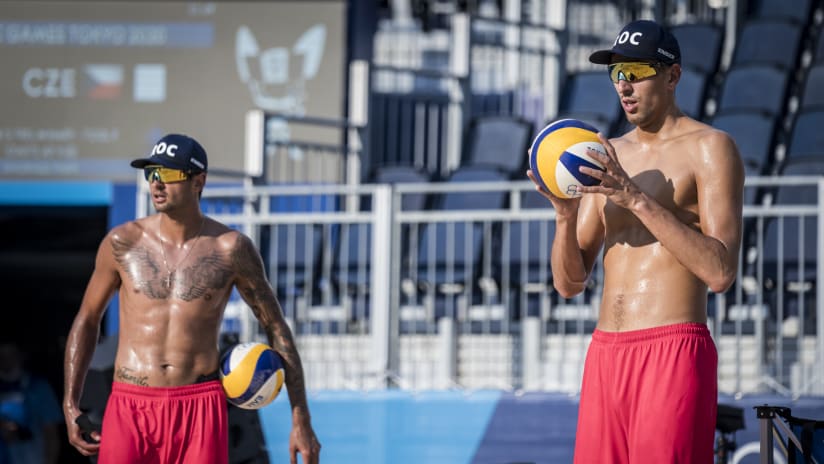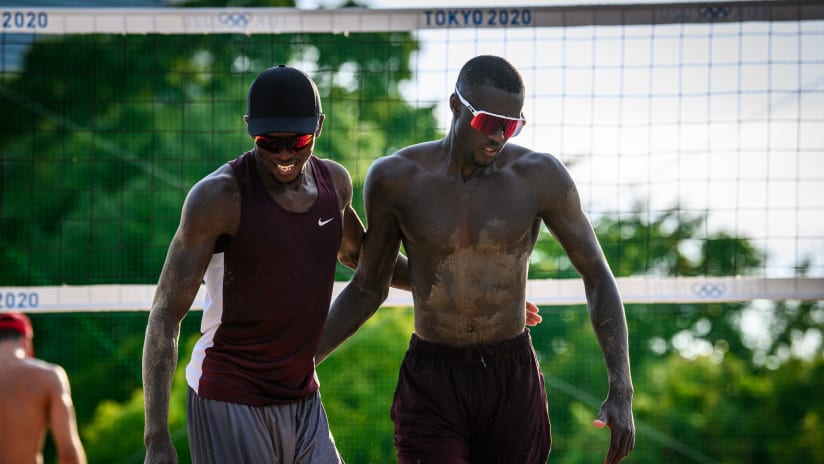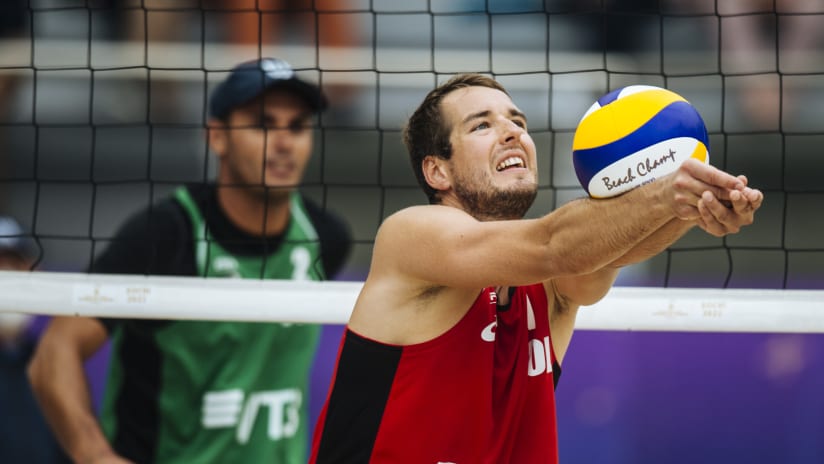Contrary to popular belief, it was not Karch Kiraly and Kent Steffes who were awarded the first Olympic beach volleyball medals in 1996. Yes, they were awarded the first gold medal, while fellow Americans Mike Whitmarsh and Mike Dodd took home the first silver.
Olympic Games Tokyo 2020 - Beach Volleyball
Will history be made on the Tokyo podium?
Canada, Switzerland, ROC, Latvia, Norway, Qatar, Poland could win first Olympic medals
Published 02:45, 24 Jul 2021

World champs Viacheslav Krasilnikov (left) and Oleg Stoyanovskiy on centre court
But the first Olympic medal was, in actuality, awarded to Canadians John Child and Mark Heese. The Canadians won six matches in bracket play, lost in the semifinals to Kiraly and Steffes, and won bronze over Portugal’s Joao Brenha and Miguel Maia. Because bronze medals are the first to be awarded, it is a fun footnote that Child and Heese can claim to be the recipients of the first medals in Olympic beach volleyball history.
Much more history can be made in Tokyo.
Brazil has won 13 Olympic medals, the United States 10. Germany is the only other country to win more than two, thanks to gold medal runs in both 2012 and 2016.
But as the game has spread, and countries both big and small have adopted the sport en masse, the talent has deepened. In 2016, Italy won its first Olympic medal, a silver to Daniele Lupo and Paolo Nicolai. The Netherlands, too, made the podium for the first time, when Alex Brouwer and Robert Meeuwsen won bronze. For the first time in Olympic history, the women’s podium featured three different countries: Germany, Brazil, the United States.
The 2021 Games is likely to feature even more history.

Cherif and Ahmed of Qatar
On the men’s side, the heavy medal favorites are three countries who have never won an Olympic medal in beach volleyball, either for the men or the women. Norway’s Anders Mol and Christian Sorum are the No. 1 team in the world and the team many expect to win gold in Tokyo. They represent a country which has never medaled in beach volleyball.
Qatar’s Cherif Younousse and Ahmed Tijan do not enter as the No. 1 seed, but they do enter as the hottest team in the world, with six finals made this season alone. They, too, represent a country that has yet to win a medal in beach volleyball.
ROC could very well win a medal on both the men’s and the women’s side. Oleg Stoyanovskiy and Viacheslav Krasilnikov and Konstantin Semenov and Ilya Leshukov are both ranked in the top 10 in the world, and are no strangers to podiums, with a combined 11 medals throughout this Olympic qualification period. The top-ranked women’s team, meanwhile, young Svetlana Kholomina and Nadezda Makroguzova, have been tremendous in 2021, with seven top 10 finishes in seven events.
Poland does not have a women’s team in the field, but it does have two men’s teams who could very well make the medal rounds in Grzegorz Fijalek and Michal Bryl, and Piotr Kantor and Bartosz Losiak. The only athlete without Olympic experience is Bryl, but he and Fijalek have won seven Olympic medals together throughout the Olympic qualification period. Kantor and Losiak, who competed together in 2016 as well, enter playing perhaps their best volleyball of the previous two years, coming off the heels of a gold medal in Sochi, and a pair of fifth-place finishes in Ostrava and Gstaad, making for six straight top-fives heading into Tokyo.
Between those two teams, they could win the first Polish Olympic beach volleyball medal.

Piotr Kantor of Poland
Both Switzerland and Latvia have won Olympic medals prior to 2021, just not on the women’s side. Both countries feature teams with medal potential. Anouk Verge-Depre and Joana Heidrich are the defending European Champs, while Nina Betschart and Tanja Huberli come in as the No. 7 seed in the entire tournament.
Latvia’s precocious duo of Tina Graudina and Anatasija Kravcenoka qualified for the Tokyo Games by winning the Olympic Qualification Tournament. While Latvia has won an Olympic medal – Janis Smedins and Martins Plavins won bronze in 2012 – it has not yet won on the women’s side. Graudina and Kravcenoka have already made history simply by qualifying, becoming the first Latvian women’s team to compete in an Olympic Games.
Further history could be made by winning the first Latvian women’s medal.
One of the most intriguing storylines, however, in an Olympic Games replete with intriguing storylines, is whether the Canadian women will continue their tour de force of history-making. Between Sarah Pavan and Melissa Humana-Paredes and Brandie Wilkerson and Heather Bansley, this past quad has been one milestone after the next: first World Championship gold, first Commonwealth Games gold, first virtually everything.
The Tokyo Games could be the first Canadian medal since Child and Heese were awarded the first one ever.
And potentially the first – of many to come – for the Canadian women.
Quick links:
Olympic Games Tokyo 2020
Facebook
Twitter
Instagram
Youtube
